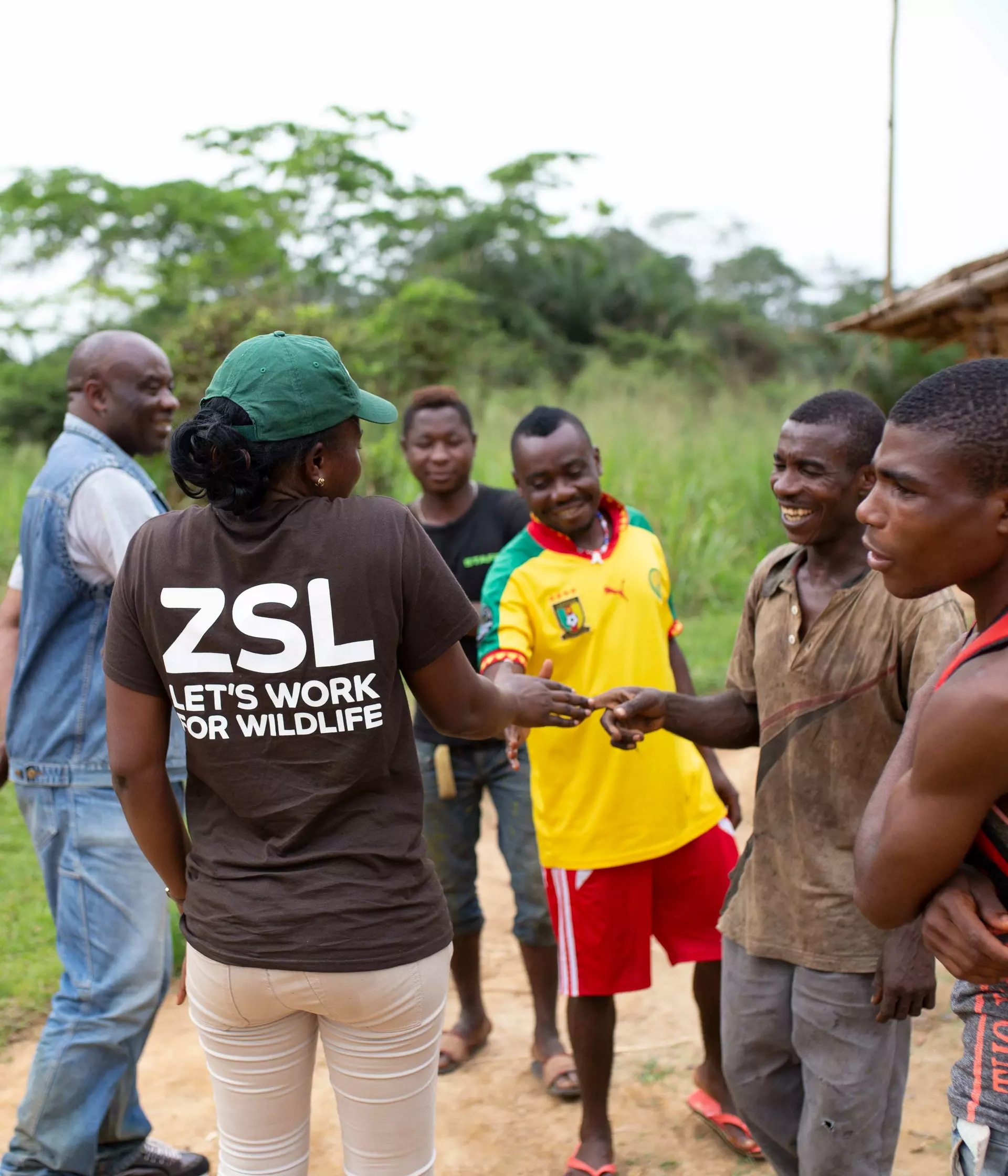Collaborating with communities to protect wildlife and restore healthy ecosystems in the Dja Biosphere Reserve
In the dense forests of the Dja Biosphere Reserve, people have been living together with wildlife for thousands of years. African forest elephants’ calls can be heard reverberating across the rainforest which the tight-knit communities of the Dja call home.
The 2 million hectares of rich lowland forest in the south and east of Cameroon is full of precious life, providing habitat for both western gorillas and chimpanzees. The reserve is a haven for nature set amongst a mosaic of forestry and mining concessions, farmland, and community-managed forests.
But the balance that has supported people and wildlife for thousands of years has now begun to shift. Extractive industries looking to exploit the natural resources are moving in, and people from outside the local communities have begun to poach unsustainably from the forest.
We are empowering local people to protect their home and the wildlife they live alongside, helping them continue to look after their rainforest. Together with our partners, we are providing our expert support to Cameroon’s government conservation service which manages the reserve.
When nature loses, we all do. Our urgent action is working to secure the future for people and wildlife so that they can thrive together. Protecting this UNESCO World Heritage Site, which is under serious threat from overexploitation.
Empowering Dja communities
We’re working with the local communities who depend on the forest and stand to lose the most. Wildlife crime and a lack of law enforcement is a real concern for residents, and we’re helping put the power back into their hands.
We’ve established community surveillance networks that collect and report vital information to stop illegal activities such as poaching, illegal mining and logging, as well as monitor law enforcement activities. Helping communities fight back against wildlife crime on their own terms, without the reliance on often unreliable law enforcement.
We have created a Village Savings and Loans Associations (VSLA) which is helping local people build better and more sustainable careers. Reducing the pressure on people to turn to wildlife crime to support their families. Providing new opportunities to help transform people’s lives, whilst having the added benefit of protecting wildlife.
We have also focused on empowering women to better and more sustainable revenue from Non-Timber Forest Products (NTFPs) like Ndjangsang, Bush mango and Ebaye. We are providing more productive village chickens and developing farming practices of banana trees, vegetables and avocado trees that exist in harmony with the forest. This is all helping create a richer and happier community, which has the tools to protect their home and wildlife.
Preventing unsustainable poaching
We are working hard to strengthen wildlife protection and surveillance across the huge reserve. We’ve been working with rangers across the globe for decades to advance anti-poaching success.
We know our experience can make a crucial difference in saving wildlife, so we are working together with partners on the ground training and mentoring to improve patrols.
Our SMART approach tool is enabling rangers to better assess poaching risks, monitor wildlife and target their protection efforts most efficiently - equipping rangers with the best knowledge and tools to safeguard the rainforests.
Biodiversity monitoring
We have deployed camera traps across the Dja to discover wildlife hotspots, keeping a close- eye on forest elephant, chimpanzee and gorilla populations.
Our ranger training includes the latest biodiversity monitoring techniques, which is advancing understanding of how species behave in the forest. We’re building a clearer picture of the population trends of key species through full faunal inventories.
This is all helping inform our conservation efforts, and better protect the long-term health of the forests. You may even be able to help identify Dja animals within our Instant Wild app, where you can contribute to spotting elephants, apes and whatever else triggers our camera traps.
Improving law enforcement to combat wildlife crime
A lack of law enforcement can be a major frustration for conservationists, residents, and wildlife lovers across the globe. Cameroon is no different, and law enforcement often lack the capacity to effectively apply wildlife laws relating to trafficked species.
We’re working to change this, by providing technical support on illegal wildlife trade cases to help prosecutors make an effective difference.
Our work with enforcement agents and courthouse staff is building an understanding of how to combat illegal wildlife crime. This involves a complex process of gathering intelligence, building cases, making arrests, managing the scene of crime and evidence, proper application of wildlife crime related laws in Cameroon and associated criminal and legal processes.
Key Species
• African forest elephant (Loxodonta cyclotis) -– Critically Endangered
• Western Lowland Gorilla (Gorilla gorilla gorilla) - Critically Endangered
• Common Chimpanzee (Pan troglodytes) - Endangered
People involved
• Andrew Fowler the West and Central Africa Regional Manager manages ZSL’s work in the Dja conservation complex.
Partners & Sponsors
• Ministère des Forêts et de la Faune de la République du Cameroun (MINFOF); Ministère de l’Elevage, des Pêches et des Industries (MINEPIA); the UK Government’s Darwin Initiative and IWT Challenge Fund; USFWS; IUCN SOS Fund; Rufford Foundation; European Union and UNESCO; TRAFFIC; African Wildlife Foundation; Société Pallisco; Société Forestière et Industrielle de la Doumé (SFID).
